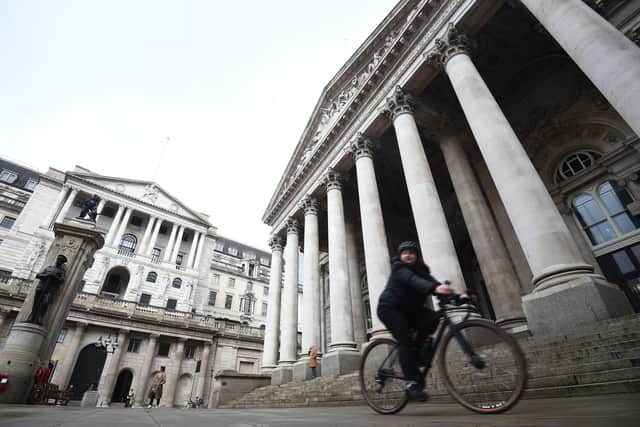Cost-of-living crisis: SNP issue mini-Budget warning as National Insurance hike reversed
The warning was issued by SNP shadow chancellor Alison Thewliss as it was confirmed the National Insurance hike introduced by Boris Johnson’s Government would be reversed from November 6.
Mr Kwarteng said he would also be scrapping the planned health and social care levy that was due to come into effect in April next year.
Advertisement
Hide AdAdvertisement
Hide AdBut the announcements came against the backdrop of an increasingly gloomy fiscal outlook, with the Bank of England indicating the UK economy was already in recession as the body raised interest rates to their highest level in more than 13 years.


The central bank raised interest rates from 1.75 per cent to 2.25 per cent – their highest since December 2008.
And experts are predicting further rate rises to come as the UK Government slashes taxes to boost growth, with Martin Beck, EY Item Club’s chief economic adviser, forecasting further hikes in November and December.
“With [the] mini-Budget likely to deliver some sizeable tax cuts, September’s increase in rates may not be the last rise this year,” he said.
Downing Street has insisted Prime Minister Liz Truss remains committed to the Conservatives’ 2019 election manifesto, despite today’s fiscal event, dubbed the Growth Plan, set to mark a sharp break with the economic policies of the Johnson administration.
Mr Kwarteng is set to announce a package of measures focused on tax-cutting, boosting investment and driving growth when he presents his mini-budget to the House of Commons.
Writing for The Scotsman, Ms Thewliss called on the UK Government to “rise to the scale of the challenge” or risk “pushing many more people into poverty and forcing businesses to pull down their shutters”.
“Reported plans to scrap the cap on bankers' bonuses, a reverse Robin Hood tax by forcing taxpayers to foot the hefty bill for the energy bill hike, cutting taxes for the rich while forcing ordinary families to shoulder the full burden of the crisis, and failing to expand the windfall tax on companies raking in excess profits, are a recipe for disaster,” she said.
Advertisement
Hide AdAdvertisement
Hide Ad“Calls for real support have so far fallen on deaf ears in Whitehall, but the Tories cannot look the other way any longer. This is the last chance for Liz Truss and her Chancellor to introduce a targeted package of support, including a real freeze on energy bills, otherwise they risk consigning millions to a devastating winter of fuel poverty.”
Confirming the reversal on the National Insurance increase yesterday, Mr Kwarteng said: “Taxing our way to prosperity has never worked. To raise living standards for all, we need to be unapologetic about growing our economy.
“Cutting tax is crucial to this – and whether businesses reinvest freed-up cash into new machinery, lower prices on shop floors or increased staff wages, the reversal of the levy will help them grow, whilst also allowing the British public to keep more of what they earn.”
The 1.25 percentage point increase in National Insurance had been announced by former chancellor Rishi Sunak to help fund health and social care.
Despite the move, think-tank the Institute for Fiscal Studies (IFS) warned most people would be worse off in real terms this year despite the massive package of Government support to deal with the cost-of-living crisis.
In an online presentation, IFS researcher Xiaowei Xu said soaring inflation meant people across the income spectrum would see a hit to their living standards.
“In real terms we expect the median earner to be £500 worse off than they were last year, which is around a 3 per cent net cut in their income,” she said.
“High earners – but not very higher earners – will be more than £1,000 worse off, which would be a larger increase in percentage terms. Lower earners and those out of work will be more shielded from the rising cost of living, both in cash terms and as a share of income.
Advertisement
Hide AdAdvertisement
Hide Ad“Even after the Government is spending vast amounts of money to protect households from the rising cost of living, most households would still see their living standards fall this year compared to last year.”
The Bank of England had previously projected the economy would grow in the current financial quarter, but said it now believed gross domestic product (GDP) would fall 0.1 per cent.
It comes after a reported 0.2 per cent fall in GDP in the second quarter and would mean the economy is currently in recession.
A technical recession is when the economy shrinks for two quarters in a row.
The decision to lift rates is a bid to keep inflation under control. It is the best tool the Bank of England has to steer inflation – sitting at 9.9 per cent – back to its 2 per cent target.
The central bank said it would consider the impact of Mr Kwarteng’s fiscal statement at its next monetary policy committee meeting.
Downing Street declined to comment on the Bank of England’s decision to raise the interest base rate.
A Number 10 spokeswoman said: “That is obviously a matter for the independent Bank of England.
Advertisement
Hide AdAdvertisement
Hide Ad“I would point you to the support that we’ve set out to help people with the cost of living, which we know is a concern for families and businesses across the country.
“I’d point you to the support that we’re providing and the immediate assistance we’ve provided for energy bills in particular.”
Comments
Want to join the conversation? Please or to comment on this article.